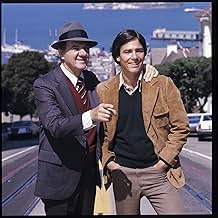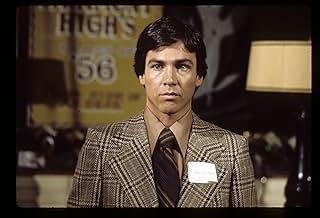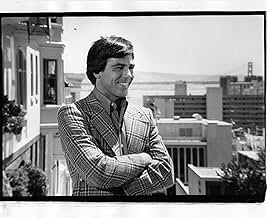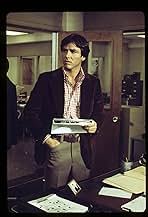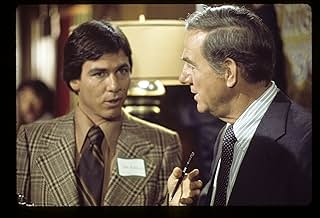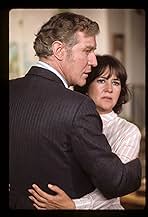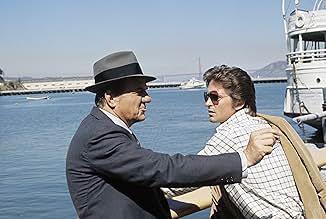Die Strassen von San Francisco
Originaltitel: The Streets of San Francisco
Ein altgedienter Polizist mit mehr als zwanzig Jahren Erfahrung arbeitet zusammen mit einem jungen Inspektor an der Aufklärung von Verbrechen in San Francisco, Kalifornien.Ein altgedienter Polizist mit mehr als zwanzig Jahren Erfahrung arbeitet zusammen mit einem jungen Inspektor an der Aufklärung von Verbrechen in San Francisco, Kalifornien.Ein altgedienter Polizist mit mehr als zwanzig Jahren Erfahrung arbeitet zusammen mit einem jungen Inspektor an der Aufklärung von Verbrechen in San Francisco, Kalifornien.
- Für 16 Primetime Emmys nominiert
- 4 Gewinne & 24 Nominierungen insgesamt
Folgen durchsuchen
Empfohlene Bewertungen
Republic Pictures' five released VHS videos which represent eight different episodes are, I hope, the first of a complete series release. In recent years, "Streets" has been relegated to the pre-dawn graveyard of Indie and cable television stations, edited down to allow for more ghastly, no-budget local ads (trade schools, lawyers, and the like). Nowadays, low self-esteem broadcasters plaster their logos and moving promo messages along the bottom of the as if the program is an interruption of their commercials. So, what a treat to see these classic episodes without all of these distractions.
Although popular enough to run for five seasons, it never received the credit it deserved -- none of the hype of a "Charlie's Angels," for example. It's too bad that Michael Douglas didn't stick with the show. His performances in "Streets" and "The China Syndrome" are among his best. I'm crossing my fingers that he'll consider returning to a follow-up "Streets" later in his career, taking the senior detective's role that Malden held in the original.
"Streets" always had tight scripts, good plotting, and interesting characters -- even if they pandered to stereotypes a little. Way ahead of its time, gay themes are treated with surprising tact and good taste. In the episode "Harem," guest star Rick Nelson plays a gay pimp for female prostitutes (a novel idea in and of itself). The word "gay" is never used, but Steve (Douglas) simply tells Mike (Malden) that, "he's not exactly what you'd call a ladies man."
The two-hour special "Thrill Killers," is perhaps the most interesting release. Patty Duke Astin plays a not-too-thinly disguised Patty Hearst (a headline story at that time) who takes a whole jury hostage and begins killing them one by one. It's a relief not to have to wait a week to see part two.
The least interesting of these releases is "Dead Air," starring Larry Hagman as a radio talk show host (reminiscent of Bill Balance's Feminine Forum, an innovative show at the time). The studio scenes are completely unrealistic and the killer can be guessed before the end of Act 1.
Unfortunately, none of these eight releases includes an episode from "Streets" most famous director, Richard Donner ("The Omen" and "Lethal Weapon" series.) Maybe they'll release some of his episodes on DVD with a director's commentary? Also missing is what I consider to be the best episode of the series, "Mask of Death," which has an amazing performance by John Davidson as a female impersonator.
Although popular enough to run for five seasons, it never received the credit it deserved -- none of the hype of a "Charlie's Angels," for example. It's too bad that Michael Douglas didn't stick with the show. His performances in "Streets" and "The China Syndrome" are among his best. I'm crossing my fingers that he'll consider returning to a follow-up "Streets" later in his career, taking the senior detective's role that Malden held in the original.
"Streets" always had tight scripts, good plotting, and interesting characters -- even if they pandered to stereotypes a little. Way ahead of its time, gay themes are treated with surprising tact and good taste. In the episode "Harem," guest star Rick Nelson plays a gay pimp for female prostitutes (a novel idea in and of itself). The word "gay" is never used, but Steve (Douglas) simply tells Mike (Malden) that, "he's not exactly what you'd call a ladies man."
The two-hour special "Thrill Killers," is perhaps the most interesting release. Patty Duke Astin plays a not-too-thinly disguised Patty Hearst (a headline story at that time) who takes a whole jury hostage and begins killing them one by one. It's a relief not to have to wait a week to see part two.
The least interesting of these releases is "Dead Air," starring Larry Hagman as a radio talk show host (reminiscent of Bill Balance's Feminine Forum, an innovative show at the time). The studio scenes are completely unrealistic and the killer can be guessed before the end of Act 1.
Unfortunately, none of these eight releases includes an episode from "Streets" most famous director, Richard Donner ("The Omen" and "Lethal Weapon" series.) Maybe they'll release some of his episodes on DVD with a director's commentary? Also missing is what I consider to be the best episode of the series, "Mask of Death," which has an amazing performance by John Davidson as a female impersonator.
San Francisco was still like THIS! Karl Malden dispensing wisdom, Michael Douglas dispensing testosterone, new Fords as far as the eye can see, and only a hint of the depravity that the city exudes. Good stories, well directed, thoughtful in short doses. Worth your time until Douglas exits, then it fades to black.
Just the opposite of Dirty Harry. Where Eastwood spent his time ranting against and beating up, shooting, or threatening hippies, women, and Blacks, these were San Francisco detectives in a show with a social conscience even while they tried to catch criminals.
Gays are depicted positively. Blacks shown sympathetically, even if guilty of crimes. Outcasts of all kinds are shown as victims of circumstances.
Probably the height of its progressive sensitivity was an episode with one of Arnold Schwarzenegger's first roles. He plays a bodybuilder who accidentally kills a woman who mocked his muscle flexing. Surprisingly, his acting was better than in most of his films.
Gays are depicted positively. Blacks shown sympathetically, even if guilty of crimes. Outcasts of all kinds are shown as victims of circumstances.
Probably the height of its progressive sensitivity was an episode with one of Arnold Schwarzenegger's first roles. He plays a bodybuilder who accidentally kills a woman who mocked his muscle flexing. Surprisingly, his acting was better than in most of his films.
This was definitely a good show and it really fed off the dynamic of the older cop (Malden) and the younger cop (Douglas). The chemistry between the two was what made the show great and it would eventually be the springboard to the later success that Michael Douglas would have in later years. Also, this show is definitely overlooked when it comes to classic police dramas. Too bad it had to come out in an era when the super cop shows dominated the television landscape.
The headline says all I think about "The Streets of San Francisco". Great scene, great screenplays, great actors, great atmosphere. Michael Douglas shouldn't have left 1976... I would have loved to see two or three more seasons with the Stone/Keller team. SIMPLY THE BEST in any way! There have been only few "great" TV crime shows during the past 30 years; I would place Streets of San Francisco on top, followed by (in no particular order) Cannon, Petrocelli, Vega$, Magnum, Miami Vice, Jack and The Fatman, and Nash Bridges. These make watching TV a real pleasure.
Wusstest du schon
- WissenswertesBy all accounts Karl Malden and Michael Douglas developed a strong professional and personal relationship from their time on the series. Twenty years after last working together on an episode they were both onstage at the 1996 People's Choice Awards. Malden referred to Douglas as "the son I never had" and mentioned that he had wanted producer Quinn Martin to cast Douglas on the series. Douglas responded to the compliment by calling Malden "my mentor," and both also expressed that they enjoyed working together on the show.
- Crazy CreditsEnd credits (from seasons 2-5): Photographed Completely On Location in San Francisco. In season 1, the production was split with exteriors filmed in San Francisco and interior scenes filmed at the Burbank Studios in Burbank, California.
- VerbindungenEdited into The Green Fog (2017)
Top-Auswahl
Melde dich zum Bewerten an und greife auf die Watchlist für personalisierte Empfehlungen zu.
- How many seasons does The Streets of San Francisco have?Powered by Alexa
Details
- Laufzeit1 Stunde
- Farbe
Zu dieser Seite beitragen
Bearbeitung vorschlagen oder fehlenden Inhalt hinzufügen

Oberste Lücke
By what name was Die Strassen von San Francisco (1972) officially released in India in English?
Antwort
